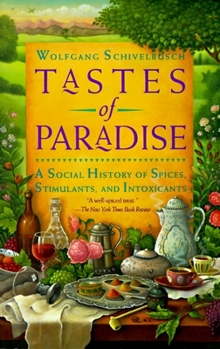Tastes of Paradise: A Social History of Spices, Stimulants, and Intoxicants
Select Format
Select Condition 
Book Overview
From the extravagant use of pepper in the Middle Ages to the Protestant bourgeoisie's love of coffee to the reason why fashionable Europeans stopped sniffing tobacco and starting smoking it, Schivelbusch looks at how the appetite for pleasure transformed the social structure of the Old World. Illustrations.
Format:Paperback
Language:English
ISBN:067974438X
ISBN13:9780679744382
Release Date:June 1993
Publisher:Vintage
Length:256 Pages
Weight:0.57 lbs.
Dimensions:0.5" x 5.2" x 8.1"
Customer Reviews
5 ratings
A Matter of Usage
Published by Thriftbooks.com User , 18 years ago
I must beg to differ with my fellow reviewers about the merits of this book. I do agree that the treatment of individual spices is cursory and that the lack of an index is a disappointment. What I find to praise here is perhaps the very thing that others find to blame. Schivelbusch has a point of view that is rooted in wanting to discover the attitudes, behavior and beliefs that underlay the European fascination with spicing foods. He offers a coherent theory-a combination of exoticism and social climbing. Then examines the consequences of this fascination in art, literature and society at large. So this is not an encyclopedia or even a particularly good guide to sources. Some of that can be better found in drier accounts like Andrew Dalby's DANGEROUS TASTES. TASTES OF PARADISE is an accessible and interesting account of the place that spices, stimulants and intoxicants have in our world. It is a brisk chronicle of what we have done with them and what they have done to us, and as that I recommend it hightly. --Lynn Hoffman, author of THE NEW SHORT COURSE IN WINE and the forthcoming novel bang BANG from Kunati Books.ISBN 9781601640005
Left me wanting more
Published by Thriftbooks.com User , 23 years ago
And I see from the reviews below that I wasn't the only one. The author has really picked a fascinating subject, and brings it to life, weaving together strands of economics, sociology, geography, and chemistry to explain some of the impacts that these now-commonplace items have had on Western culture. (And what impacts our culture has had on the items - did you know that chocolate was a drink for monks and aristocrats before it became a snack for children?)But the book is far too short. Many subjects are merely glanced over, and the illustrations, in addition to being so numerous as to be suspected of being filler, are often dark and hard to make out. I would have rather seen the author do a book this size on any one of the various subjects at hand - just coffee, say, or just pepper - and really explored it in depth.
Engaging and readable
Published by Thriftbooks.com User , 24 years ago
Schivelbusch's Tastes of Paradise provides a refreshingly light-hearted, yet engaging glimpse at some of the substances which, through our stomachs, lungs, and palates, have played a not insignificant role in personal and cultural interactions of European civilizations. Concentrating primarily on western societies between the sixteenth and nineteenth centuries, Schivelbusch devotes over 50 pages to each of the subjects of coffee, tobacco, and alcohol; he also includes ample discussion of the historical role of chocolate, spices, and nineteenth-century opiates. I read this book as part of a college-level World History class (middle ages- present) and found it to be an enjoyable and worthwhile complement to novels, primary sources, and textbook readings we studied. Spread out in small doses over the course of the semester, it provided an unusual vantage point from which major themes such as Industrialism, Christianity, Romanticism, and social class structures could be more readily understood. Over 100 black-and-white reproductions of period art enhance Schivelbusch's lively discussion of the material. Without suggesting that these substances played an unrealistically inflated role in history, Schivelbusch offers a highly accessible discussion equally suitable for the student or casual reader.
A very good look at the role of consumables in society
Published by Thriftbooks.com User , 25 years ago
I picked up his first edition many years ago when I was working as a coffee roaster. For those who take for granted the morning cup of coffee or tea, or that cigarette...this is an excellent book.
Simple and Lucid View of Stimulants Throughout History
Published by Thriftbooks.com User , 29 years ago
This book is so easy to read that you might not believe it's written by a serious German sociologist. Especially given our current coffee craze, it's fascinating to see when different stimulants (coffee, tea, chocolate, etc.) came into popularity in history. For example, before the 17th century, all they drank in England was coffee. Then strangely, they totally switched to tea and there doesn't appear to be any logical explanation. But, to sum up, this is actually a FUN sociology book.






